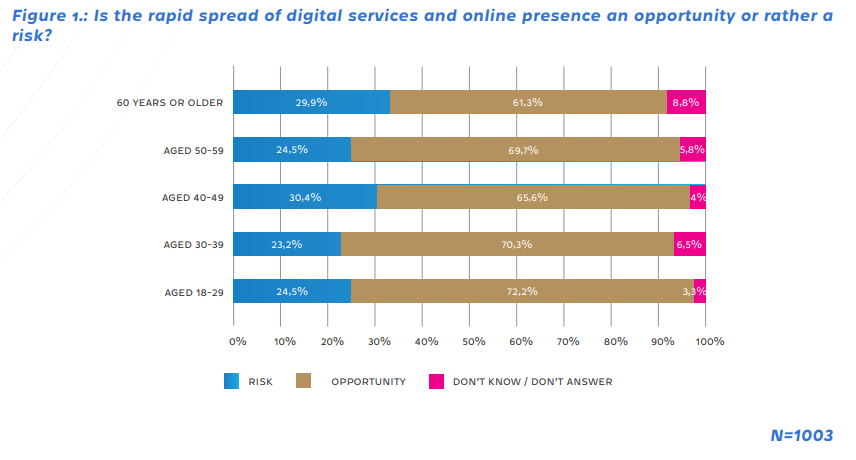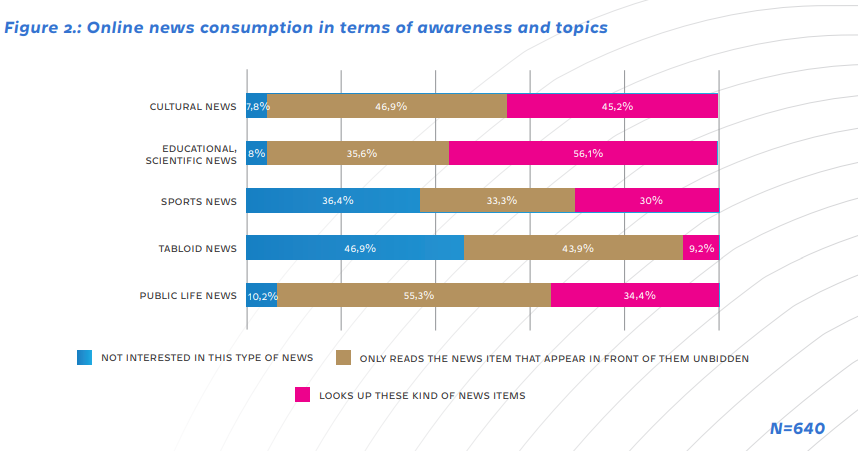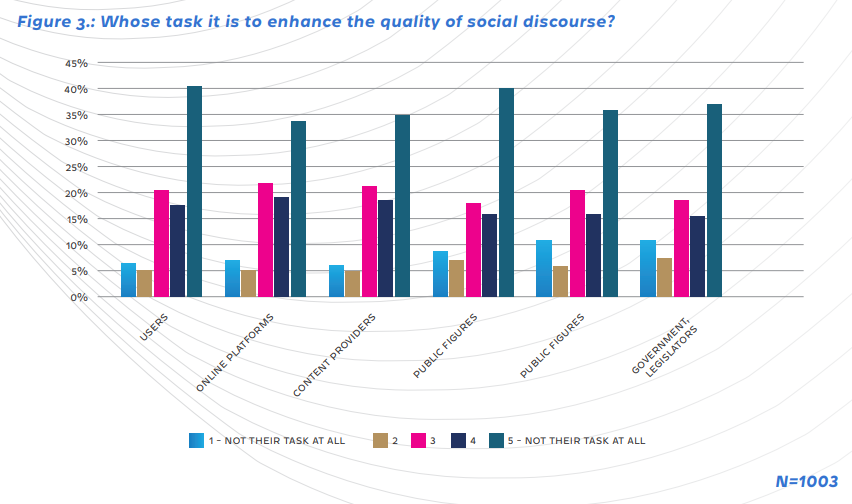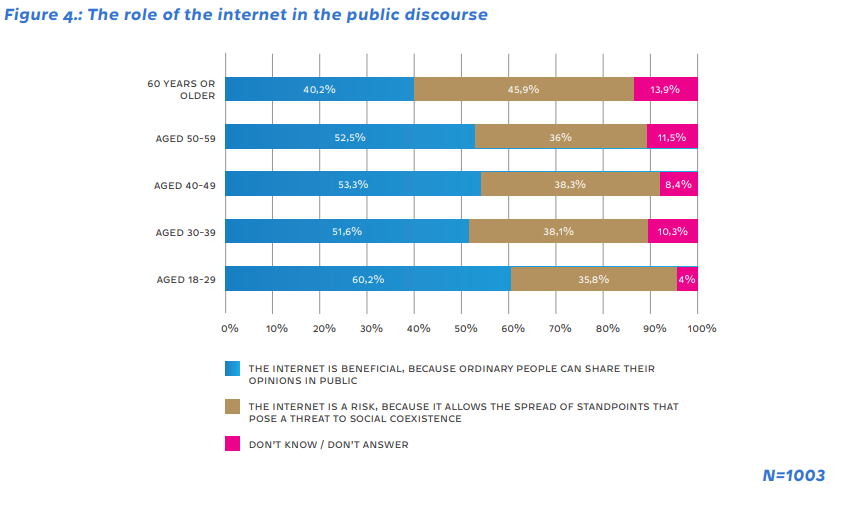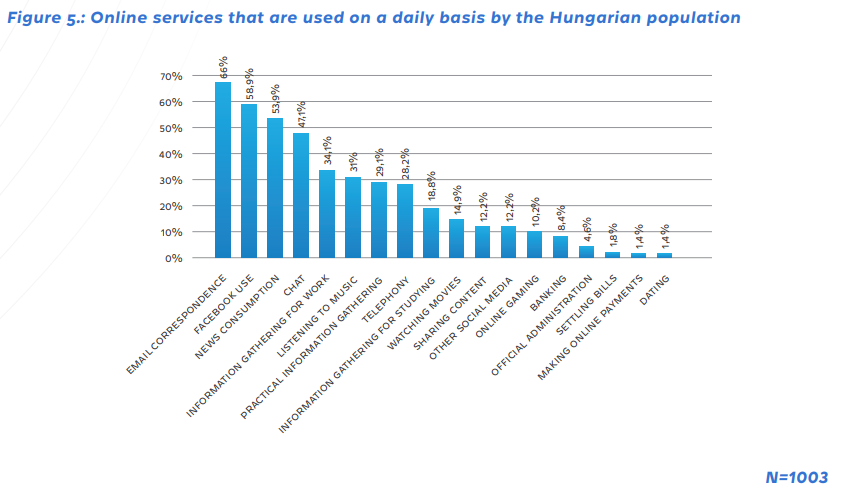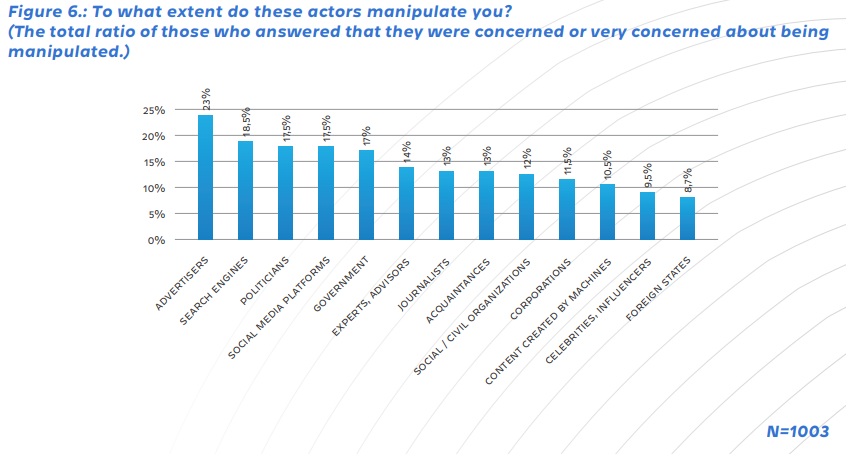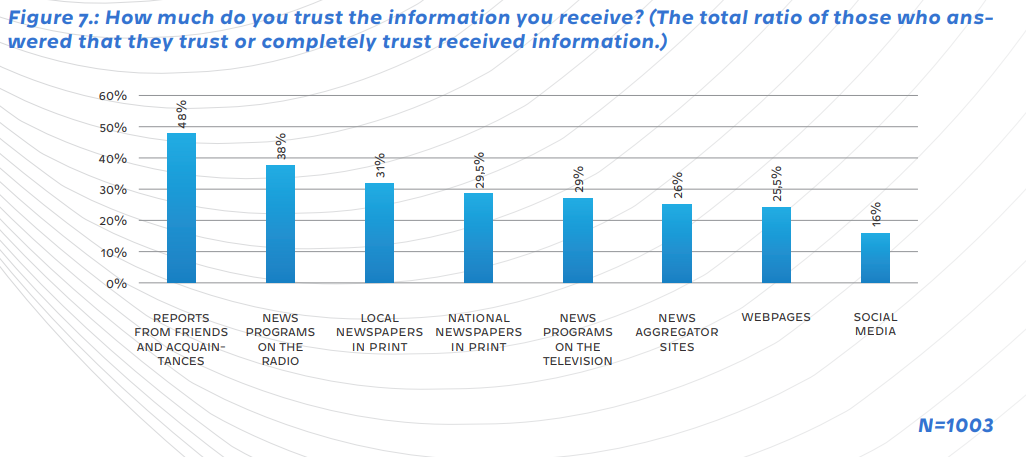At the Institute of the Information Society (IIS), established at the University of Public Service of Hungary in February 2019, researchers from various academic fields conduct complex analyses into the effects of info-communication services and new technologies on people, societies, states, fundamental rights and the public sphere, and related regulatory issues. In order to investigate the reality of digital culture and to accurately identify which processes require regulation, IIS aims to facilitate national academic and societal discourse by filling research gaps.
In our first empirical study, we were interested in identifying the features which characterise Hungarian adults’ use info-communication technologies (mainly for communication purposes). In addition to mapping usage habits, the research also aimed to determine the degree to which Hungarian people trust the stakeholders and services of the information society, their level of awareness in the online sphere and the risks they identify in connection with the spread of new technologies.
A representative collection of data at a national level was commissioned by the IIS, which was achieved by conducting telephone interviews with 1003 individuals. The sample acquired by this research is representative of the total Hungarian adult population in terms of age, sex, level of education, settlement type and region. The telephone data collection was carried out by the Hungarian member of the European MASMI market research network, the MASMI Hungary research company. The data were collected in October 2019. In the near future, the IIS will launch a follow-up survey to assess the changes in the attitudes of Hungarian citizens caused by their increased digital presence during the COVID-19 pandemic.
The detailed results of the comprehensive survey will be shared as they become available with the general public by our researchers in the upcoming period. After the data has been processed by our researchers, the data will be shared with anyone upon request. Below we wish to share the main findings of the research.
1. Ambivalent relation to the internet
The results of the research show that the majority of the Hungarian population has an ambivalent attitude towards the online world; tension can be observed between the value judgements of respondents to the internet and their actual internet usage characteristics.
According to 60.5% of the overall Hungarian population, online communication opportunities are detrimental to the quality of personal relationships, yet 63% think that social media provides an excellent opportunity for keeping in touch with both family members and friends.
80% cite as an advantageous trait of the internet that it enables one to connect with acquaintances easily, but 58% fear that online forms of contact will take the place of direct personal contacts. Besides this, 57% think that online communication consumes too much time from their lives.
In spite of these ambivalent feelings, a clear majority, 66.5%, believe that the rapid development of digital services and online actions creates an opportunity for both the individual and society. 27% think that this poses a risk.
2. Insufficient awareness
According to the results of the research, the majority of the Hungarian population fail to pay attention to several important issues which allow the internet to be used as consciously and prudently as possible.
Only 28% of the people in the whole population take steps to educate themselves to be able to face the challenges posed by the online world. The majority of them, 52.2%, educate themselves through information acquired from friends, while 47% read scientific articles and 20% have participated in courses.
71% of the total population and 61% of people who are raising children below the age of 14 do not use any kind of filtering software in order to protect themselves from harmful content present on the internet.
37% answered “yes” when asked whether they had ever refrained from using the internet because they were conscious that everything leaves a trace in the digital world. 63% answered that this had never happened to them.
It can be deduced from the results of the research that the majority of Hungarian internet users are, in most cases, not aware of which acts are legal and which are illegal when using digital services. 37.5% answered with a confident no to the question of whether it was legal to make a bank transfer outside the European Union.
3. Passive news consumption, journalism is considered important
The internet is used for news consumption by 54% of the people daily, by 14% of the people several times a week, and by 8% of the people at least once a week or more than once per month.
The role of social media is significant in news consumption: 75% of the internet users surveyed use these services for this purpose with some regularity (37% use it daily, 19% use it more than once per week for news consumption, 9% at least once a week and 9% once a month).
Public affairs news is principally consumed passively by the majority. 35% of the respondents said that they deliberately searched for such news. 55% of the respondents only read articles that appear in front of them unprompted, while only 10% of the respondents said that they were not interested in public affairs news. (1)
The percentages that are missing for completeness were generated by answers such as “doesn’t know / doesn’t wish to answer.”
53.7% of the respondents indicated that they were interested in opinions on public affairs that differed from their own, but only if they appeared in front of them “by themselves.” Only 19% of the respondents actively search for differing opinions on the internet, while 23.7% prefer to only be exposed to viewpoints that are identical to their own. However, only a small number of people become annoyed when they come across opinions different from their own (2.4%).
The majority of those surveyed, 54%, prefer to access the news directly, without any evaluation or analysis, while 40% of the respondents prefer to consume news accompanied by evaluation or analysis. A substantial majority of 61% think that the activities of newspapers and journalists are essential parts of the public discourse. 33%, however, disagree with that statement.
49% of the people interviewed said that the internet was beneficial because it allowed ordinary people to share their opinions with other members of the public, while 40% said that they perceived the internet as a risk because it allows the free circulation of views that posed a threat to social coexistence.
The societal judgement on anonymous commenting was rather negative. 67% of the interviewed persons deemed this feature of the internet detrimental because it encourages irresponsible communication. 26.5% of the respondents believed that this form of communication is a good thing because it allows for many people to express their opinion freely.
The results of the research clearly show that Hungarian people deem that the improvement of the social discourse on the internet is the shared responsibility of all affected parties (e.g., of the users, platforms, content providers, politicians, authorities, government).
4. Facebook is a highly significant forum for national public discourse
Several questions aimed to address the Facebook usage habits of Hungarian internet users.
Usage data shows that Facebook is a social media service with a particularly strong market presence in Hungary. While 79% of the internet users use Facebook at least once a month (59% use it daily, 16.5% at least once a week), all the other social media platforms (Twitter, Instagram, LinkedIn etc.) are used at least once a month by 27% (daily by 12%, weekly by 11%).
10% of Hungarian Facebook users stated that Facebook had removed one of their Facebook posts, or that they had been banned from using the service for a while.
According to the results about Facebook’s current role in the national social dialogue, 68.5% of the Facebook users use the service weekly for news consumption (48% daily), and only 11% do not use the service for this purpose at all.
46% of the users agree – at least largely – with the statement that Facebook can be used remarkably well as a social forum (for conducting public activities and expressing opinions) or for news consumption. 10% strongly disagree or somewhat disagree with this statement.
5. No generation gap between general attitudes
The results of the survey show that there are no significant differences between differing age groups of Hungarian society as a whole in terms of general attitudes to the information society and the digital world.
Even when comparing the youngest age group surveyed (aged between 18-29) with the oldest age group surveyed (older than 60 years), a similar proportion of people think that online means of communication are detrimental to the quality of personal relationships (58.3% vs. 61%). Likewise, a similar proportion of them think that online communications take up too much of their time (58.7% vs. 53%).
A clear majority of people in all age groups deem that the internet to be beneficial for information gathering because it allows them to access important information rapidly and directly. Overall, 55% of the Hungarian population agrees with this, while 36% think that the internet is somewhat risky to use because it allows uncontrolled information to reach them.
It is also true within all age groups that the vast majority of people view the rapid development of the digital world as an opportunity, in contrast with people who think that this is a threat. The exact percentages are 71% vs. 24.4% within the youngest age group and 61.3% vs. 29.9% within the eldest age group.
No differences were found between age groups in open-mindedness towards different opinions on public matters. 74.5% of the youngest demographic were interested in different standpoints (but only 24.5% search for them) while within the eldest age group this percentage is 76.7% (with 23.3% actively searching for different viewpoints to theirs).
It is very interesting, however, that some significant differences were identified between the approaches of the younger and the older generations regarding some more specific issues, especially ones addressing social discourse:
- 49% of all respondents think that the internet is beneficial because it allows ordinary people to share their opinion within the public sphere, while 40% deem that the internet carries the risk of the free spread of opinions that are dangerous for social coexistence. Within the youngest age group, the percentages are 60-36%, while in the oldest group they are 40-46%
- A much larger proportion of the younger people judge the opportunity to post anonymous comments positively. While the majority (56%) thinks that anonymous commenting is a phenomenon that prompts irresponsible statements, 41% see them as a way of ensuring freedom of expression. The percentages within the oldest age group are 70% for the former view and only 19% for the latter.
- Although the majority of the youngest demographic (52%) deem journalism a very important part of social discourse/discourse, 44% believe that, in the age of the internet, the need for newspapers and journalists is decreasing. By comparison, 63% the members of the eldest age group think that the role of journalism is indispensable, with only 27% disagreeing.
6. Most people use smartphones for surfing the internet
Several questions addressed internet usage habits. through It must be highlighted from the results that smartphones are very common nowadays, as 75% of the people own them. The outstanding role of smartphones can be illustrated by the fact that 78% of the Hungarian population are internet users, and the majority– 64% – connect to the internet via smartphones. 46% use laptops, 36.6% use desktops, and 20.5% use tablets to access the internet.
Of the services that are used on a daily basis, emailing is the leading use (66%) followed by using Facebook (59%) and consuming news (54%).
7. We are not afraid of manipulation, yet we do not trust the information we receive
The majority of the Hungarian population is not afraid of being manipulated by specific stakeholders of the online world, the stakeholders which caused most concern were advertisers, although only 23% felt this.
However, it cannot be stated that a large proportion of people would trust the authenticity of various information sources. Most cited their friends and acquaintances as trusted information sources (48%), yet only 16% trust in the authenticity of information received through social media.
(1) The percentages that are missing for completeness were generated by answers such as “doesn’t know / doesn’t wish to answer.”
You can download the survey report here: Trust, Awareness and Alarm on the Internet
